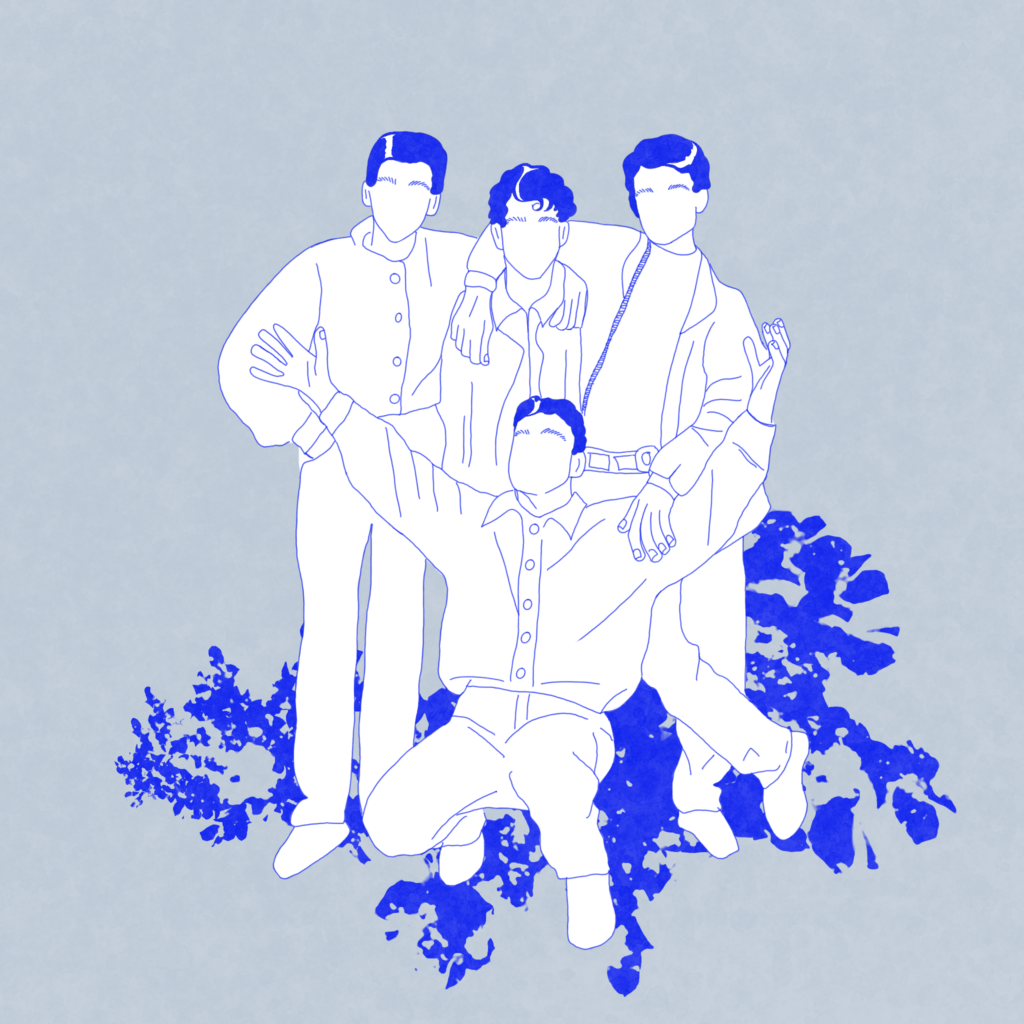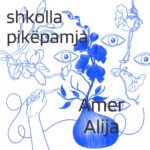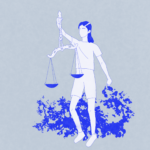WHEN FEAR OVERCOMES, WHERE DOES LOVE GO?
–
GRESA NUREDINI ARCHIVES MOMENTS OF JOY IN DARK TIMES.

Illustration: Argjirë Kukaj
I wasn’t born yet when my grandma was kicked out of her job only because she was Albanian nor was I born when the war in Kosovo happened and when bombs were raining down from jet planes.
Yet, this historical chapter of the place I call home is very familiar to me. It is very familiar from the stories I heard growing up and the stories I continue hearing to this day from the people I am surrounded by every day and night. From the people that were there. These stories are about house gatherings as sanctuaries of joy; about going out secretly during police lockdowns and the bravery it took to venture outside; about new year’s celebrations without knowing what the future holds.
As sad as these stories seem to me, they are also moments of profound happiness that could only be captured in photographs.
This collective memory is infused with sadness, suffering, and oppression. Until now, I only had pieces of these moments, of the traces of joy people would find in their darkest hours, of the shared solidarity in their grimmest days. I never contemplated how these feelings can all come together at once nor what these moments looked like until I heard about the work of a young artist named Gresa Nuredini.
Nuredini is a researcher for the British magazine Business Reporter, who during her lifetime developed an artistic appreciation for photography.
Besides her work at the magazine, she is working on a project to create a collective archive of photographs from the 90s, in Kosovo. The aim of Nuredini’s project is to send us on a journey as the past unfurls its chapters, as intricate as they are heartrending, one truth stands resolute.
During a time of profound transformation of a society, such as the time of jumping from war to peace, the documentation of historical narratives preserved through collective memory is fundamental. For this history mustn’t be lost.
In the 90s, in Kosovo, fear was the standard emotion, so the question that was brought up in my mind was: “When fear overcomes, where does love go?” This project tells the testament of the human spirit as a catalyst of resistance during dark times. Love intertwines with memory, bearwitnessing between individuals in intimate spaces while shaping the collective memory of love during the 90s in Kosovo.
This time is distinguished with “sub-realities” created by a community, in a place where news sources were suppressed and information was heavily controlled by the regime and people did not know what was happening in a close distance. A “parallel universe” emerged as a necessity to survive and to try to live a normal life. People relied on each other. Individualism faded, while the collective flourished.
In an era when the youth’s life was under siege, and all they had was each other, Gresa will take us on a journey that reveals a poignant truth. Even during those hours when strolling the streets past 10 pm was forbidden, people discovered their own pathways to happiness, dance, love, and laughter, evading the looming existential crisis.
When I met with Gresa while having coffee she said that these photographs at the time were made by people to be archived, but to create memories for themselves. And, when I asked what made her start this project she said “It all started with a personal strain of curiosity stretching upon the desire to digitalize my family’s archive of photographs from the 90’s. A pattern scattered within the photographs captivated me by surprise; people always shared the film pose, and there was hardly-ever only a person at once Everything was shared in the 90’s, even the fear.” She also stated that “I want to know what happened behind those photographs, to tell the story of love shared between the collective at that time, a certain love that speaks above an image’s surface, I want all to know.”
Taking note of the beauty and importance of this project, I and Gresa invite you to become part of this project and discover the circuitous passage of love in hardships by submitting your family photographs that symbolize love and unity inside a collective to be archived from a visual, philosophical and ethical point of view. A collection of carefully selected photographs will be compressed into a photobook to symbolize an album of photographs from the people to the people.
These photos are personal items that people all over Kosovo have in their houses for themselves, but the aim is with the open call for these photos to be submitted by anyone so they can be digitized and exhibited.
If you have photographs that could be valuable to be archived, on September 27, in the Center for Narrative Practice there will be a workshop where you can digitize your photos and make them a crucial part of this archivation. You can also submit your photos online to arkiva1990@gmail.com until October 30.
This collection is intended for public distribution and will be made available to all for free.
After the publication of the photobook, a subset of the 30 selected photographs will also be on display in a public exhibition during February 2024.
Author: Nol Musa


